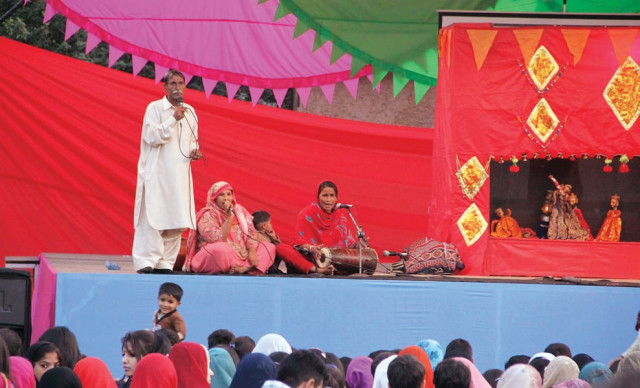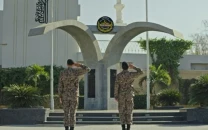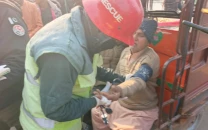Plight of the puppeteers: a waning craft
The 11th National Folk Puppet Festival highlights the reasons behind the dieng art form.

Live performances at the 11th National Folk Puppet Festival. PHOTOS: PUBLICITY
This year there are no foreign puppeteers at the 11th National Folk Puppet Festival. The festival, which has been largely known for its scale, this year has returned to its roots, trying to bring together all of what constitutes the local puppet scene.
It provides for an interesting barometer of how much the art has been neglected in the country, and how the contemporary forces of television and media have played a role in this.

Asghar Bhawalpuri, who leads the Bhawalpur puppet theatre troupe, started an unlikely career in puppetry in 1995. The slightly framed man estimates there are only 20-25 puppeteers in the country, and only five professional troupes. The main festival has been this one, and has been organised by the Rafi Peer Theatre Workshop. This was a long-time dream of the late Faizaan Peerzada, who also launched the first Museum of Puppetry in Lahore, which houses an array of folk and traditional puppets from both Pakistan and the world over.
Bhwalapuri has specialised in glove and rod puppetry and says that from the beginning of his career, he had been infatuated by the various figures he could make with his bare hands. Glove puppetry is associated with modern puppetry and consists of puppets that are worn on the hands and operated through hand motions.

“This for children really, as it not only entertains, but also brings forth a message,” says Bhawalpuri, who has no familial ties to puppetry. “My inspiration had come from television actually, along with Farooq Qaiser,” he says. “My gut tells me people want the craft of puppetry to continue, but the emphasis on the craft tells me otherwise.”
While television may have been the inspiration for Bhawalpuri, the puppet scene has been limited to the avenues of festivals, foreign tours and the variety of art councils throughout the country. Saidaan Peerzada says this year’s festival did not receive the same financial support that was provided in previous years, so it meant that the scale of reach was minimised, but he said the intent has been maintained. “Ideally, there will be many more festivals like this, which will cater to smaller towns and cities of the country.”

“This year we did not receive the same media coverage that we had in previous years. Our position has always been that if the festival takes place here every year, it must be held in at least 10 to 15 other major towns. As a result, these puppeteers will gain exposure, jobs and along with that, they will become more serious about their craft,” says Saidaan.

Zulfiqar Ahmad, of the National Puppet Theatre at the Pakistan National Council of Arts (PNCA), is different from other puppeteers who lament lack of avenues and government support. He started puppetry in 1975 and was given support from the government in 1979 to study puppetry in China. As one of the few formally trained modern puppeteersm, he says the government’s role in his profession has been beneficial in sustaining the troupe, which is based in Islamabad.
“A puppet, traditionally, has not been able to play a role in a film or television, because you need a complete team to make it work. These have to be independent performances that tell a story and send a message. We have been able to travel all over Pakistan and do regular shows, so I think the role has been positive,” says Ahmad.
Published in The Express Tribune, April 1st,2014.
Like Life & Style on Facebook, follow @ETLifeandStyle on Twitter for the latest in fashion, gossip and entertainment.



















COMMENTS
Comments are moderated and generally will be posted if they are on-topic and not abusive.
For more information, please see our Comments FAQ